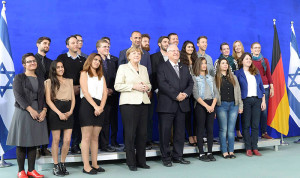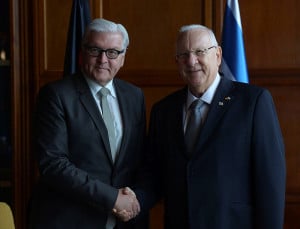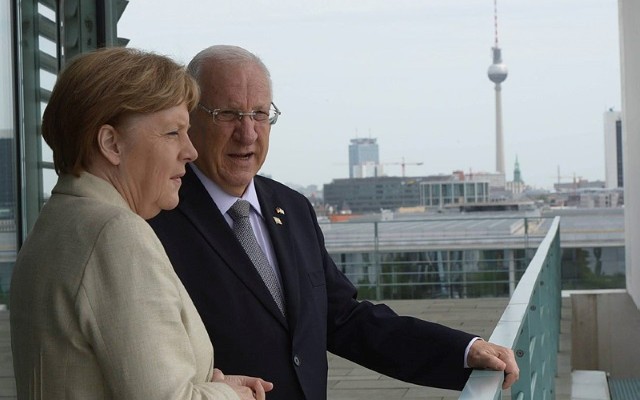While affirming Germany’s commitment to Israel’s security and lauding the relations between the two countries, Chancellor Merkel said that a deal with Iran is unlikely.
By: Aryeh Savir, World Israel News
The prospects of reaching a deal between the P5+1 powers and Iran regarding its nuclear aspirations are not promising, Germany’s Chancellor Angela Merkel told President Reuven Rivlin on Tuesday during a working meeting, the Jerusalem Post reports.
The Israeli president met with Merkel during a three-day state visit to Germany to mark 50 years of diplomatic relations between the two countries.
Merkel defended the negotiations currently underway, saying that Iran has made progress in nuclear technology and that a deal may prevent further advancements in this field. She also reiterated Germany’s commitment to Israel’s security.
Rivlin repeated Israel’s conviction that tougher sanctions on Iran would be a more effective measure in halting the nuclear program. If attacked, Israel will defend itself to the best of its ability, he said.
The two leaders discussed the importance of strengthening the friendship and cooperation between Israel and Germany, and specifically the need for young citizens of both countries to understand their past and look to the future in order to preserve the excellent relations.
A True Friend of Israel

President Rivlin and Chancellor Merkel with 20 young Israelis and Germans. (Amos Ben Gershom/GPO)
Rivlin told the chancellor that he saw her as a true friend of Israel and thanked her for her support over the years. “I am pleased to be here as your guest in order to celebrate 50 years of diplomatic relations between our countries,” he said. “In the last 50 years, we have built a relationship rooted in friendship, mutual understanding and the ability to look to the future while learning from the lessons of the past. It is a great honor for me to be the President of Israel with the opportunity to mark alongside you this remarkable jubilee.”
After the meeting, Rivlin and Merkel met with 20 young Germans and Israelis with whom they held a wide-ranging discussion on their visions for the future of relations between the two countries.
“You, the youth, are the future of the world, you who are learning about what happened in the past, while looking at the future, out of a concern that fractures be healed and lessons be learned,” said Rivlin. “The world’s youth are the leaders of the future, and it is they who provide both peoples with the ability to look to the future, not by ignoring the past, [but] by learning from it. Our discussion here is not just about the relationship between Israel and Germany, but a way for us to envisage a better world and a better future for all of us.”

President Rivlin meets with German FM Steinmeier. (Amos Ben Gershom/GPO)
The fact that the young representatives of both nations were sitting together, “and indeed the relationship between Germany and Israel, is itself a miracle,” Merkel said.
“I am amazed by the courage of Israel’s politicians who continue to look straight into the future without forgetting the past,” she added. “I am delighted to meet you here today, to mark together 50 years since the establishment of diplomatic relations between Israel and Germany.”
The 20 youths who participated in the meeting – 10 Israelis and 10 Germans – were participants in a special Youth Congress that took place in Berlin with the objective of creating discussion analyzing the relationship between the two countries and peoples and participation in joint working sessions and partnership in the fields of culture and the arts.
Earlier in the day, Rivlin met with German Foreign Minister Frank-Walter Steinmeier, who said that “fundamentalism is not solely a threat to Israel, but a danger to the whole world – and to Europe in particular.”




